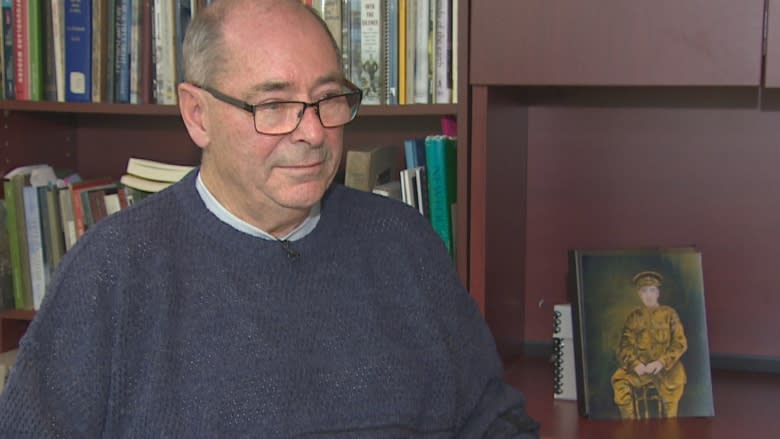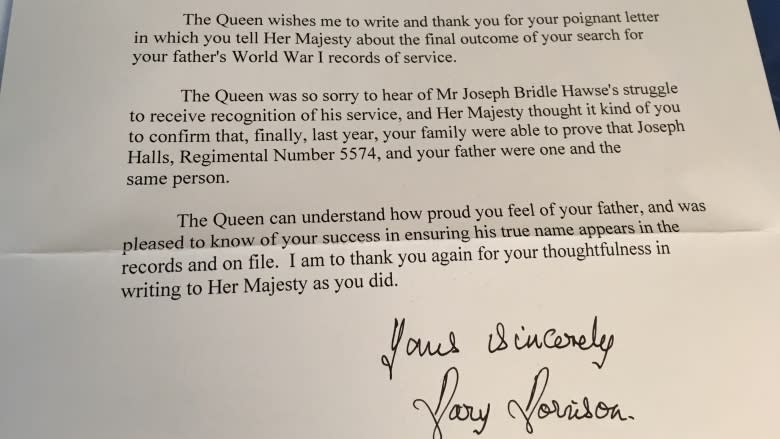Correcting an error: How a spelling mistake cost a Regiment veteran recognition for decades
Joseph Hawse experienced the horrors of the First Word War, earning one dollar a day to kill the enemy and subsist in rat-infested trenches, but he and his son spent almost six decades fighting for the recognition of his sacrifice as part of the Newfoundland Regiment.
"Nobody ever believed him," said his son Donald Hawse, fighting back tears.
But Joseph Hawse was always telling the truth, and it took many years for how a small chain of errors — a misheard name, a spelling mistake — caused untold harm to a family.
As an 11-year-old young boy, Donald, who is now 69, saw what that denial and rejection was doing to his father — and launched what turned out to to be an almost 60-year-old crusade to make it right.
A broken man
The Hawse family was poor, 13 children in total, and living hand-to-mouth in a house in St. Lawrence, on Newfoundland's Burin Peninsula.
"Our house had no running water, we had no bathtub," said Donald.
"So we didn't have a lot, but we had each other."
But Donald always knew something wasn't right with his dad.
"He would spend days just staring into space ... At some point, he gave up. There were days we went without food. We depended on welfare," Donald told CBC News.
No recognition of serving in the war meant no pension.
An appeal to the Queen
The insistence that Hawse did in fact fight for his country was met with skepticism, even contempt.
"Every day I fought on the way to school, somebody who would have a comment about my family, or me or my dad most likely," Donald said.
Enough was enough, he thought.
"He served for England [in the Royal Newfoundland Regiment] so why don't we write to the Queen?" Donald said, figuring the best approach to sort out the issue was to go right to the top.
He didn't expect a response, but one came back, which further complicated things.
The closest match to Joseph Hawse was someone by the name of Joseph Halls, with the regimental number 5574.
"My dad said, 'Well, that's my number.'"
So, the numbers matched, but the names didn't.
The quest for recognition continues
Buoyed by the all-important regimental number matching up — and the similarities between the two names — it became clear what had happened, what had created this roadblock in the first place.
"You have to picture this, OK? This is a probably shy, 17-year-old boy with a bay accent," Donald said.
"And [the ones registering enlistees] wrote what they heard and what they heard was Joseph Halls [not Joseph Hawse]," said Donald, who noted his father was illiterate and could not write his own name.
Joseph's hometown of Lewin's Cove became Lewis Cove on the official record, too.
Joseph didn't know this mix-up would haunt him for years, long after he returned from battle — all he knew at the time was he was signing up to fight for freedom.
"I think it was his proudest moment ever. He had now sworn to serve king and country," said Donald, his voice cracking with emotion.
Catch 22
Father and son were hopeful now — surely since the name and hometown mix-up had been figured out, Joseph would be rightfully recognized as fighting in the First World War?
"It was a catch 22 — we could never get the file to prove that it was one and the same," said Donald.
The records containing the information of soldiers were private and inaccessible.
Joseph Hawse died in 1980 — his quest to prove he served in the Royal Newfoundland Regiment and fought in the First World War went unfulfilled.
A breakthrough
But then, in 2016, things changed for the better.
Donald had once again renewed his quest to right the injustice to his father.
By now, the records that father and son had worked tirelessly to access — to show that the so-called Joseph Halls of Lewis Cove was really Joseph Hawse of Lewin's Cove — had become public.
When Donald heard that, he called archivist Larry Dohey, the manager of collections and special projects at The Rooms in St. John's.
"When I discovered that, as an 11-year-old, he writes the Queen to get information on his father, I said, 'This is a man that is quite determined. And I will do everything in my power to help him find the father that he lost,'" said Dohey.
For the record, a correction
Dohey made good on his promise. The records have been corrected and Joseph Hawse of Lewin's Cove is now officially a veteran, recognized as one of the young soldiers who left Newfoundland to fight.
For Donald, it was the long-awaited, emotional ending he had wondered would ever come.
"Probably the most emotional experience of my life," he said, noting many tears were shed.
There was jubilation, relief and a twinge of the bittersweet.
"Had it happened while he was alive, his life would have been different. God, I wish he had seen it," said Donald.
That long-pursued recognition means Hawse's headstone in St. Lawrence will be taken down and the caribou engraved on it along with his regiment number.
For Donald, his siblings, and other descendants of Joseph Hawse, there is finally some peace.
"If there is a Heaven and God, my father is sitting there saying, 'I told you so,'" said Donald.




